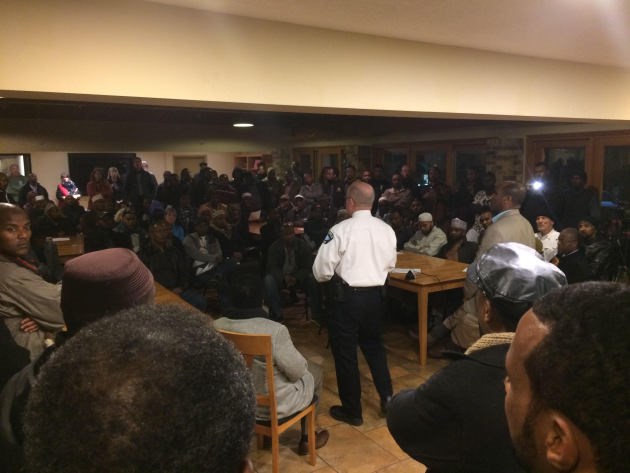
Friday November 27, 2015
By Libor Jany

Third Precinct inspector Michael Sullivan speaks to community members. Libor Jany/STAR TRIBUNE
A day after a shooting in the Seward neighborhood that left two young Oromo-American men dead and a third seriously wounded, police officials said they needed the East African community's help in solving the case.At an emotional community meeting Monday night, officials faced some tough questions about last weekend's double slaying, in which Abdulahi Awuni, 19, and Rastem Abubakar, 24, both of Minneapolis, were shot while sitting in a car parked outside the Cedar 94 apartment building. No arrests have been made in the case.
Lt. Rick Zimmerman said the Somali and Oromo communities needed to step up to help police find the mystery gunmen.
"The most important way that we solve murders is by the community coming together and helping us do our jobs," said Zimmerman, head of the MPD’s homicide unit. "No one deserves to do that to them; they were born into this world and only God can call them back.
"No can just shoot somebody and think they can get away with it," he said.
Medical examiners found that Abubakar died of a gunshot wound to the head, while Awuni was shot multiple times. The third victim, whose name and age haven't been released, was taken to an area hospital with noncritical injuries, police said."It was a very brazen shooting,” Third Precinct inspector Michael Sullivan told the several hundred people packed into the apartment building’s meeting room. “The victims were in the vehicle and it was parked and they were approached by some suspects, we believe, and there was some conversation and they were shot."
Sullivan said that homicide detectives were still trying to determine what led to the shooting and encouraged any witnesses to speak to police. Listening from the back of the room were Christopher Granger, the recently-appointed commander of the Violent Crimes Investigations Division, and several of the of the department's Somali-American officers.
Some in the crowd on Monday implored witnesses from the local immigrant community, where distrust of law enforcement has always run deep, to come forward and cooperate with the investigation.
"This is not a community of East African, Somali or Oromo, this is a community of all of us," said Amano Dube, executive director of the Brian Coyle Center, a community center in the Cedar-Riverside neighborhood that all three victims frequented. "What has been troubling over the last several years is seeing our young men and women being murdered in a peaceful nation."
"What's wrong with us?" he asked. "We don't speak up."
Abdi Warsame, Minneapolis' first Somali-American Council member, told the crowd: "We are an American people: it doesn't matter if you're Somali, Oromo or Eritrean."
Police officials, whose work to forge close ties with the East African community has earned national recognition, said that gaining the Somali immigrants’ trust has proved challenging because a legacy of police corruption in their war-torn homeland has harmed their perception of law enforcement.
The killings on Sunday evening were Minneapolis’ 42nd and 43rd homicides of the year, putting the city on pace to have its deadliest year in nearly a decade. Not included in that tally is one killing that is being investigated as self-defense and another in which medical examiners were unable to establish whether a man shot himself or was killed by someone else. And on Monday, police arrested a man in connection with the suspected death of a 25-year-old single mother who had been missing since last week, according to police and community sources.
News of the men’s deaths brought an outpouring of grief from their friends and family on social media.
“RIP Rastem your wisdom was heard and will always be remembered,” one user tweeted. Another, with the handle FavEthio, posted that her "heart goes out to Rastem's family."
Somali community activist Abdirizak Bihi said that Awuni was a well-known spoken word artist who performed regularly at local social events. Awuni, he said, was about to start a new job at a local theater company before he was killed.